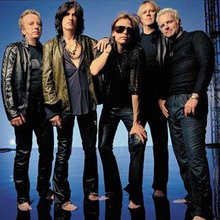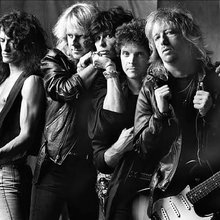Known for an aggressively rhythmic style as rooted in James Brown funk as in more traditional blues, Aerosmith were the top American hard-rock band of the mid-Seventies; if you set foot in a high school parking lot back then, the verbose back-alley numbers on 1975's Toys In The Attic and 1976's Rocks were inescapable. But the members' growing drug problems and internal dissension contributed to a commercial decline that accelerated through the late Seventies and early Eighties. Two crucial lineup changes and a few poorly received albums preceded a 1984 reunion of the original lineup and the multiplatinum Permanent Vacation, which signaled one of the most spectacular comebacks in rock history. Though by this time they were presenting themselves as vociferous adherents to the sober lifestyle, Aerosmith retained much of their bad-boy image. And despite a considerably more commercially slick and power-ballad oriented sound than they'd first emerged with, frequently drawing on outside songwriters, they managed to became even more popular the second time around.
Aerosmith was formed in 1970 by Joe Perry, Tom Hamilton and Steven Tyler, who was then a drummer. The group was completed with drummer Joey Kramer and Brad Whitford; Tyler, with his trademark high shriek, became lead singer. For the next two years all five members shared a small apartment in Boston and played almost nightly throughout the area, occasionally venturing to New York City. Clive Davis saw the band perform at Max's Kansas City in New York and signed them to Columbia. A minor hit and future FM-radio staple from their debut, "Dream On," strengthened their regional following.
Meanwhile, Aerosmith began to tour widely. In 1976 "Dream On" recharted, rising to Number Six. And by the time of "Walk This Way" (Number 10, 1977), the band had become headliners. Its phenomenal success was short-lived, however. A series of sold-out tours and platinum albums hit its peak in 1976.
By 1977 the group's constant touring and its members' heavy drug use (Perry and Tyler were nicknamed "the Toxic Twins" for their substance abuse) had begun to take their toll. After months of rest, Aerosmith recorded Draw the Line and appeared as the villains in Robert Stigwood's movie Sgt. Pepper's Lonely Hearts Club Band. Their version of Lennon and McCartney's "Come Together" from the soundtrack was a minor hit. But Aerosmith was unraveling: In 1979, admitting to long-standing personality and musical conflicts with songwriting partner Tyler, Perry quit and started a band called the Joe Perry Project. Jim Crespo took his place. The next year Whitford departed to form the Whitford/St. Holmes band with ex—Ted Nugent sidekick Derek St. Holmes and was replaced by Rick Dufay. Neither Perry's nor Whitford's records sold particularly well.
Rock in a Hard Place, Aerosmith's first new recording in almost three years and the first without Perry, peaked at Number 32 in 1982. But in early 1984 the five original members met backstage at an Aerosmith concert and decided to re-form. Done With Mirrors, their first "comeback" LP, sold moderately. But he group's re-ascendance began in earnest when Aerosmith collaborated with Run-D.M.C. on the duo's hip-hop version of the 1975 Aerosmith warhorse "Walk This Way." That fall, just as "Walk This Way" was peaking at Number Four on the pop chart, Permanent Vacation (Number 11, 1987) was released. The album wound up spawning three hit singles, while the songs' videos introduced Aerosmith to the MTV generation. Aerosmith further consolidated its success with the critically acclaimed, quadruple-platinum Pump (Number Five, 1989), which boasted three Top 10 hits. "Janie's Got a Gun" (Number Four, 1989), about a teenage girl getting revenge for incestuous molestation by her father, won 1990's Grammy for Best Rock Performance by a Duo or Group With Vocal.
In 1991 the group signed a record deal with Sony worth a reported $30 million for four albums. Three years later, in summer 1994, Aerosmith landed a seven-figure deal from G.P. Putnam's Sons for their group autobiography. With the hit ballads "Living on the Edge" (Number 18, 1993), "Cryin" (Number 12, 1993) and "Crazy" (Number Seven, 1993) ubiquitous on MTV, Get a Grip hit Number One, followed by 1994's double-platinum Number Six greatest-hits package, Big Ones.
But Aerosmith soon re-entered rougher waters. The band started working on the follow-up to Get a Grip, but didn't get along with producer Glen Ballard, who left in the middle of the sessions and was replaced by Kevin Shirley. Meanwhile, Joey Kramer's father had died, sending the drummer into such a depression that he had to be replaced by session drummer Steve Ferrone on some tracks. In the midst of it all, the band fired its longtime manager, Tim Collins, who had helped the musicians through sobriety and helmed their Eighties comeback. Collins retaliated by suggesting that some of the band members had fallen off the wagon; Tyler was then accused of "not being part of the team" in a letter sent to him by his four bandmates. Tyler denied taking drugs, insisting, "I've had no mood-altering substances in 10 years."
When Nine Lives finally came out in 1997, it entered the chart at Number One. And though the album didn't yield a major hit single, "Pink" (Number 27, 1998) earned Aerosmith another Grammy, for Best Rock Performance by a Duo or Group With Vocal. In 1998, "I Don't Want to Miss a Thing", Aerosmith's contribution to the soundtrack of Armageddon (which starred Tyler's daughter Liv), became a Number One pop hit, and was nominated for an Academy Award. In early 2001, Aerosmith was inducted into the Rock and Roll Hall of Fame, just as the band's new album, Just Push Play (Number Two, 2001) scored with the powerpoppish hit single "Jaded" (Number Seven, 2001).
O, Yeah! The Ultimate Aerosmith Hits (Number Four, 2002) was the first best-of collection to combine music from the band's Columbia and Geffen tenures. Tours with the likes of Kiss and Kid Rock followed, as did Honkin' on Bobo (Number Five, 2004), an album of blues covers that was certified gold in the U.S, despite its ill-advised title. In 2006, though, two members of the band fell ill: Tyler announced that he had ruptured blood vessels in his larynx, while Hamilton disclosed that he was being treated for throat cancer. Both recovered, though Hamilton missed much of the band's 2006 tour. Nonetheless, in 2007, the band performed one of its most geographically extensive tours ever, traveling to countries like Russia and Latvia for the first time in its career
When the band went on the road again in 2009, the tour hit a number of snags, as Whitford and Hamilton recovered from surgery and Tyler from a leg injury. In August 2009, Tyler fell off a stage in South Dakota, damaging his back and neck; he was taken to the hospital, and the show was canceled. Within a few days, the rest of the tour was called off as well, though select concerts were performed later in the year. Rumors circulated in November 2009 about Tyler leaving the band, but this speculation was scuttled when he joined Perry for a performance of "Walk This Way" in New York that month.
Tyler entered rehab shortly after the surprise appearance, and in May 2010 Aerosmith launched another world tour — even though their most recent album was now nearly a decade in the past. Toward the end of the tour, word surfaced that Tyler was signed to be a judge on American Idol. In typical Aerosmith fashion, the rest of the band first learned about it from news reports. "It's one step above Teenage Mutant Ninja Turtles," a furious Perry told the press. "I don't want Aerosmith's name involved with it." In early 2011, Aerosmith (sans Perry) cut a series of demos for a possible new album. At the same time, however, Tyler continued work on his solo debut — leaving the future of the band as murky as ever.

